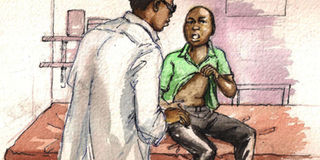How death may occur during surgery

A 17-year-old Senior Four student had noticed an on and off swelling in his groin. He went to hospital and was told that he had a defect in the muscles of his abdominal wall through which the contents of his abdomen were protruding.
This condition, he was told, was an abdominal hernia and needed a surgical operation to correct it. He was reassured that it was not yet an emergency and it could be operated on during his Senior Four vacation if it remained as it was.
The doctor, however, warned him that if the swelling persisted or became painful he should seek immediate medical attention. Neither of the two happened.
The student returned to hospital after completing Senior Four examinations. The doctor examined him again and was satisfied that the student was fit for surgery. The doctor scheduled him for surgery.
He told the student that there was no need for him to be admitted in the hospital as the surgery would be done under local anesthesia and he would return home that same day. But this was not to be; he was not to return home alive.
The student, accompanied by his elder brother, came for the operation as scheduled. The operation notes indicated that anesthesia was applied to the area of operation (this is what is known as local anesthesia) and the operation was carried out.
However, in the course of the operation, the pain became unbearable for the student. A decision was then taken to give the student general anesthesia. This is the anesthesia that makes a person “sleep”.
Unfortunately the student developed complications and died a few hours later. The relatives demanded an investigation into the death of the student who was apparently well except for the hernia.
A postmortem was carried out. The postmortem examination showed that the student had died as a result of aspiration pneumonia.
The student had choked when the contents of the stomach had entered his lungs; a well known side effect of general anesthesia especially when a patient has not fasted prior to the operation.
It is mandatory that a patient undergoing a major elective (planned) operation involving general anesthesia should starve for at least 12 hours before the operation.
This is to ensure that the stomach is empty to avoid the very common danger of vomiting and aspirating the contents of the stomach into the lungs.
There is no evidence that the student had been asked to starve overnight and the surgical team apparently did not bother to find out if the student had starved overnight.
Deaths following medical procedures such as surgical operations are a common cause of litigation as some of the deaths are due to medical negligence. Deaths in the cause of or as a result of a surgical operation may be due to:
•The disease for which the patient is being operated
•Another disease condition not related to the disease for which the operation was being carried out
•Errors in the administration of the anesthesia
•Effects of the anesthesia itself
•Poor monitoring of the patient, during and after the operation
•Poor surgical techniques or the effect of the surgery
•Surgical mishaps or accidents such as injuring a major blood vessel
•Post-operative complications such as infections and pulmonary embolism
Before a patient is operated upon, they must be examined and a proper diagnosis made and the patient must be prepared for the surgery. The diagnosis must be the medical reason for the operation. It is very unfortunate that sometimes patients are operated when there is actually no sound reason for the surgery.
To be continued




